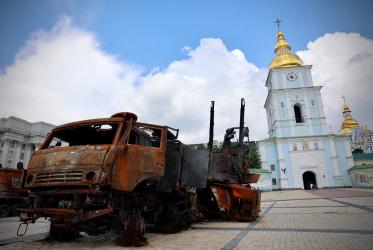The conflict started on 4 November after Ethiopian prime minister Abiy Ahmed launched a military offensive against the semi-autonomous region of Tigray, over an alleged takeover of a national army base in the capital, Mekelle, by the Tigray People’s Liberation Front (TPLF).
The actions triggered fighting between the national army and the TPLF with the Tigrayan leader, Debretsion Gebremichael vowing to defend his region.
Barely two weeks into the conflict, thousands of refugees have streamed into neighbouring Sudan, with fighting and airstrikes reportedly killing hundreds. A massacre of civilians has also been reported in Mai-Kadra in South West Tigray.
“It is very disheartening that the leaders have ruled out any possibility for peace talks, but I don’t think this can be solved through military means,” said Rev. Dr Fidon Mwombeki, a Tanzanian Lutheran pastor who is general secretary of the All Africa Conference of Churches.
Under the Ethiopian federal system, states which mirror the region’s ethnic composition are allowed a security force, a parliament and a right to a referendum on self-rule.
Mwombeki expressed sadness that Ethiopia, which has been seen as Africa’s beacon of peace, hope and renaissance was now descending into a conflict.
On 16 November, the All Africa Conference of Churches invited prayers for a quick return of peace in the Horn of Africa country, while expressing solidarity with millions of Ethiopians affected by the conflict.
“Unless there is a peaceful settlement, I don’t think war will solve the problem. Violence begets violence,” he warned.
Ethiopia’s Inter-religious Council, a grouping of Christians and Muslims which includes the Ethiopian Orthodox Tewahedo, the Catholic and the Ethiopian Evangelical Lutheran churches—among others—expressed sadness at the conflict and condemned the killing of innocent people.
“We would like to remind you that war is destructive. It is the worst option to resort to due to its human and economic cost. Especially when two brothers are fighting, no one comes [out as] the winner,” said the council in a 5 November statement.
The religious leaders called on the national government and Tigray to prioritize the safety of the citizens and stability of the nation.
While urging the Prosperity Party—the party Ahmed formed after dissolving the ruling Ethiopian People’s Revolutionary Democratic Front—and the TPLF to hold dialogue, they called for religious leaders’ mediation. Elders, mothers and influential people are called upon to push for reconciliation, among other proposals.
On 7 November, Cardinal Berhaneyesus Souraphiel, the Catholic archbishop of Addis Ababa, expressed regret that initial attempts by religious leaders, elders and other stakeholders to bring the two sides to the negotiating table were unsuccessful.
“It has worried us that the difference is now transformed into armed conflict. We…urge the parties to immediately stop the armed conflict and start peaceful dialogue,” said Souraphiel.
In a statement released in November, the World Council of Churches executive committee lifted up in prayer the people and churches of Ethiopia. “The WCC condemns the numerous brutally violent attacks against churches and communities especially affecting the Ethiopian Orthodox Tewahedo Church, on the members of any community defined by religion or ethnicity, on churches and holy places, and on civilians by armed groups,” reads the statement. “We mourn the deaths of so many people in recent attacks.”
Agencies fear a humanitarian crisis is unfolding in Tigray as thousands of refugees seek safety in eastern Sudan. According to the UNHCR, the UN’s refugee agency, women, children and men have crossed the border at a rate of 4,000 per day.
So far, an estimated 27,000 had reached Sudan through the Hamdayet border point in Kassala State, Ludgi in Gedaref State and more recently at a location on Aderafi border.
A growing number of internally displaced persons has been reported in Tigray, with humanitarian agencies unable to offer sufficient response due to lack of electricity, fuel, telecommunication services and cash.
The numbers are adding to more than 100,000 Eritrean refugees in four camps in Tigray who were displaced in the 1998-2000 Ethiopia-Eritrea border war.






